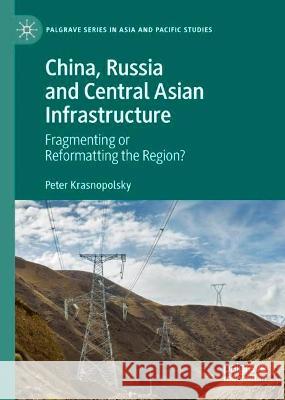China, Russia and Central Asian Infrastructure: Fragmenting or Reformatting the Region? » książka
China, Russia and Central Asian Infrastructure: Fragmenting or Reformatting the Region?
ISBN-13: 9789811942532 / Angielski / Twarda / 2022
China, Russia and Central Asian Infrastructure: Fragmenting or Reformatting the Region?
ISBN-13: 9789811942532 / Angielski / Twarda / 2022
(netto: 461,12 VAT: 5%)
Najniższa cena z 30 dni: 424,07
ok. 16-18 dni roboczych.
Darmowa dostawa!
This book evaluates Central Asian regionalism by analyzing the impact of Russia and China on physical infrastructure in the region. The narrative builds a picture of the nature of the two powers’ influence on the development of regional connectivity in Central Asia. The study covers the 30-year period since the dissolution of the Soviet Union, with a focus on the last decade preceding the global pandemic. Qualitative research methods, i.e., documentary analysis, media analysis, and elite interviews, are implemented to explore how activities of Russia and China impact regional cooperation among Central Asian states. Multiple case studies of projects in the networked sectors of infrastructure, i.e., transportation, energy, and telecommunications, are used to build the argument and demonstrate the ways in which Russia’s and China’s engagement influence regional connectivity. The book is of interest to the scholars who study international relations in Eurasia, major power relations, Sino-Russian relations, China foreign policy, international institutions in Asia, multilateralism, and regionalism. The empirical depth of the book attracts attention of area studies scholars who focus on Central Asia, Central Eurasia, and any of the five Central Asian states. Additionally, the scholars who analyze the roles of hard infrastructure find the book particularly important. The in-depth cases on multilateral financial institutions and regional networks, particularly energy, transportation, and telecommunication, are of great value to those interested in these respective sectors.











